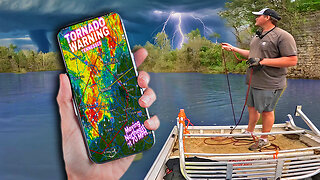Premium Only Content

BEACH
A beach is a landform alongside a body of water which consists of loose particles. The particles composing a beach are typically made from rock, such as sand, gravel, shingle, pebbles, etc., or biological sources, such as mollusc shells or coralline algae. Sediments settle in different densities and structures, depending on the local wave action and weather, creating different textures, colors and gradients or layers of material.
Though some beaches form on freshwater locations, most beaches are in coastal areas where wave or current action deposits and reworks sediments. Erosion and changing of beach geologies happens through natural processes, like wave action and extreme weather events. Where wind conditions are correct, beaches can be backed by coastal dunes which offer protection and regeneration for the beach. However, these natural forces have become more extreme due to climate change, permanently altering beaches at very rapid rates. Some estimates describe as much as 50 percent of the earth's sandy beaches disappearing by 2100 due to climate-change driven sea level rise.[2]
Sandy beaches occupy about one third of global coastlines.[2] These beaches are popular for recreation, playing important economic and cultural roles—often driving local tourism industries. To support these uses, some beaches have man-made infrastructure, such as lifeguard posts, changing rooms, showers, shacks and bars. They may also have hospitality venues (such as resorts, camps, hotels, and restaurants) nearby or housing, both for permanent and seasonal residents.
Human forces have significantly changed beaches globally: direct impacts include bad construction practices on dunes and coastlines, while indirect human impacts include water pollution, plastic pollution and coastal erosion from sea level rise and climate change. Some coastal management practices are designed to preserve or restore natural beach processes, while some beaches are actively restored through practices like beach nourishment.
Marine debris on a beach in Hawaii.
Wild beaches, also known as undeveloped or undiscovered beaches, are not developed for tourism or recreation. Preserved beaches are important biomes with important roles in aquatic or marine biodiversity, such as for breeding grounds for sea turtles or nesting areas for seabirds or penguins. Preserved beaches and their associated dune are important for protection from extreme weather for inland ecosystems and human infrastructure.[2]
-
 DVR
DVR
Kim Iversen
2 hours agoAncient Cover-Up: Here's WHY They're Hiding The Truth About The Egyptian Pyramids
4.98K10 -

Exploring With Nug
7 hours agoCaught on the Water During a Tornado Warning! Magnet Fishing Gets Scary!
104 -
 LIVE
LIVE
The Jimmy Dore Show
39 minutes agoJordan Peterson Wants “Guardrails” on Rogan’s Guests! RFK Drops Hammer on Food Dyes! w/Ashton Forbes
4,963 watching -
 1:11:56
1:11:56
vivafrei
4 hours agoCuomo for Prosecution! Fox News Goes Woke? And Whatever Else the News Brings! Viva Frei Live!
22.6K12 -
 1:55:48
1:55:48
Redacted News
2 hours ago🚨 WW3 Alert! Ukraine's ARMY is collapsing and Zelensky is trying to scuttle peace plans | Redacted
74.3K89 -
 1:16:09
1:16:09
The White House
2 hours agoPresident Trump Signs Executive Orders, Apr. 23, 2025
5.87K16 -
 57:36
57:36
Candace Show Podcast
2 hours agoENOUGH! It’s Time For Jordan Peterson To Clean His Own Room | Candace Ep 181
24.4K83 -
 LIVE
LIVE
LFA TV
21 hours agoALL DAY LIVE STREAM - 4/23/25
625 watching -
 LIVE
LIVE
Dr Disrespect
6 hours ago🔴LIVE - DR DISRESPECT - WARZONE - HOW TO WIN SOLO GAMES
2,171 watching -
 UPCOMING
UPCOMING
Rebel News
19 hours agoSPECIAL LIVESTREAM: Minor Party Debate with Avi & Rukshan
7.74K5